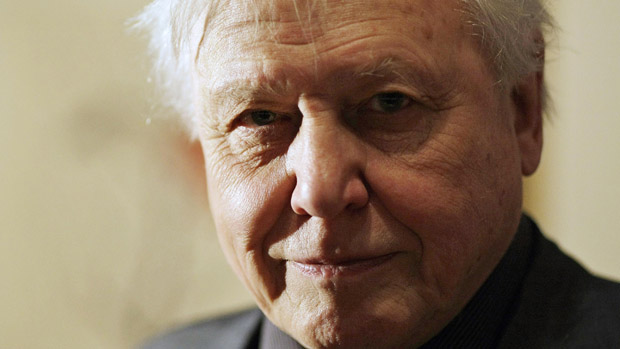David Attenborough warns of ‘crisis moment’
Experts reveal 2019 was the second hottest on record for the planet’s surface

A free daily email with the biggest news stories of the day – and the best features from TheWeek.com
You are now subscribed
Your newsletter sign-up was successful
David Attenborough has warned that “the moment of crisis has come” in efforts to tackle climate change, as it was revealed that 2019 was the second hottest on record for the planet’s surface.
The broadcaster told the BBC that “we have been putting things off for year after year”, adding: “As I speak, south east Australia is on fire. Why? Because the temperatures of the Earth are increasing.”
He also argued that it was “palpable nonsense” for some politicians and commentators to suggest that the Australian fires were nothing to do with the world becoming warmer.
The Week
Escape your echo chamber. Get the facts behind the news, plus analysis from multiple perspectives.

Sign up for The Week's Free Newsletters
From our morning news briefing to a weekly Good News Newsletter, get the best of The Week delivered directly to your inbox.
From our morning news briefing to a weekly Good News Newsletter, get the best of The Week delivered directly to your inbox.
Speaking of efforts to address this, he said: “We have to realise that this is not playing games. This is not just having a nice little debate, arguments and then coming away with a compromise.
“This is an urgent problem that has to be solved and, what’s more, we know how to do it - that’s the paradoxical thing, that we’re refusing to take steps that we know have to be taken.”
Attenborough’s comments came in a BBC News interview to launch a year of special coverage on the subject of climate change, Our Planet Matters.
–––––––––––––––––––––––––––––––For a round-up of the most important stories from around the world - and a concise, refreshing and balanced take on the week’s news agenda - try The Week magazine. Start your trial subscription today –––––––––––––––––––––––––––––––
A free daily email with the biggest news stories of the day – and the best features from TheWeek.com
His warning comes as scientists say the past five years and the past decade were also the hottest in 150 years. Speaking to The Guardian, they describe the news as “dire”.
“The last decade was easily the warmest decade in the record and is the first decade more than 1C above late 19th-century temperatures,” said Gavin Schmidt, of Nasa’s Goddard Institute for Space Studies. “What is important is the totality of evidence from multiple independent data sets that the Earth is warming, that human activity is driving it and the impacts are clearly being felt.”
The effect of this will continue, says World Meteorological Organisation secretary general Petteri Taalas.
“Unfortunately, we expect to see much extreme weather throughout 2020 and the coming decades, fuelled by record levels of heat-trapping greenhouse gases in the atmosphere,” he said.
Last month, the United Nations warned of a global crisis as scientists said tipping points are “dangerously close”.
-
 The problem with diagnosing profound autism
The problem with diagnosing profound autismThe Explainer Experts are reconsidering the idea of autism as a spectrum, which could impact diagnoses and policy making for the condition
-
 What are the best investments for beginners?
What are the best investments for beginners?The Explainer Stocks and ETFs and bonds, oh my
-
 What to know before filing your own taxes for the first time
What to know before filing your own taxes for the first timethe explainer Tackle this financial milestone with confidence
-
 The plan to wall off the ‘Doomsday’ glacier
The plan to wall off the ‘Doomsday’ glacierUnder the Radar Massive barrier could ‘slow the rate of ice loss’ from Thwaites Glacier, whose total collapse would have devastating consequences
-
 Can the UK take any more rain?
Can the UK take any more rain?Today’s Big Question An Atlantic jet stream is ‘stuck’ over British skies, leading to ‘biblical’ downpours and more than 40 consecutive days of rain in some areas
-
 As temperatures rise, US incomes fall
As temperatures rise, US incomes fallUnder the radar Elevated temperatures are capable of affecting the entire economy
-
 The world is entering an ‘era of water bankruptcy’
The world is entering an ‘era of water bankruptcy’The explainer Water might soon be more valuable than gold
-
 Climate change could lead to a reptile ‘sexpocalypse’
Climate change could lead to a reptile ‘sexpocalypse’Under the radar The gender gap has hit the animal kingdom
-
 The former largest iceberg is turning blue. It’s a bad sign.
The former largest iceberg is turning blue. It’s a bad sign.Under the radar It is quickly melting away
-
 How drones detected a deadly threat to Arctic whales
How drones detected a deadly threat to Arctic whalesUnder the radar Monitoring the sea in the air
-
 ‘Jumping genes’: how polar bears are rewiring their DNA to survive the warming Arctic
‘Jumping genes’: how polar bears are rewiring their DNA to survive the warming ArcticUnder the radar The species is adapting to warmer temperatures